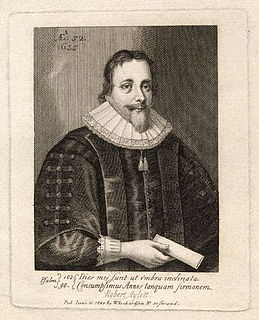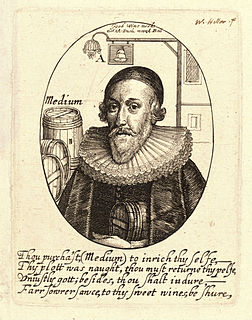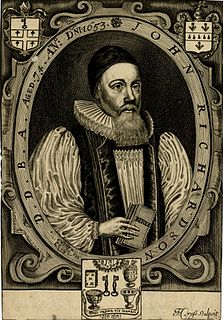William Bagwell (fl. 1655) was a London merchant and writer on astronomy.
Contents

William Bagwell (fl. 1655) was a London merchant and writer on astronomy.

The inscription on his portrait in 1659 gives his age as 66, so that he was probably born in 1593. [1] According to his own account in The Mystery of Astronomy made Plain, he was a merchant, had travelled and traded widely; overseas losses led to his being sent to prison for debt. In 1654 he had been in and out of prison for twenty years. After being set at liberty in 1654 Bagwell was put by some friends in good employment.
In confinement Bagwell wrote an Arithmetical Description of the Celestial and Terrestrial Globes; the manuscript is in the British Library. [2] In 1655 he published The Mystery of Astronomy made Plain, a simplification of his more elaborate treatise. Philip Bliss, in a note to Anthony Wood [3] states that he dedicated his Sphinx Thebanus or Ingenious Riddle, 1664, to the physician Humphry Brook as patron.
In 1645 Bagwell had published The Distressed Merchant, and Prisoners Comfort in Distress, a piece of doggerel, which was caricatured in Wil Bagnal's Ghost, or the Merry Devill of Gadmunton in his Perambulations of the Prisons of London, by Edmund Gayton, 1655, and in Will Bagnalls Ballet, in Wit Restored, 1658. Bagwell also published another short poem, entitled An Affectionate Expostulation for the Pious Employment both of Wit and Wealth. In 1652 there was published, by order of Oliver Cromwell, A Full Discovery of a Foul Concealment, or a True Narrative of the Proceedings and Transactions of the Committee for the Accompts of the Commonwealth of England with William Bagwell and John Brockedon, accomptants, Discoverers and Plaintiff's against the Committee of Hartford, the Treasurer and Paymaster there in the year 1643; but this William Bagwell may be another person.
John Phillips (1631–1706) was an English author, the brother of Edward Phillips, and a nephew of John Milton.

William Augustus Guy was a British physician and medical statistician.

Samuel Bolton was an English clergyman and scholar, a member of the Westminster Assembly and Master of Christ's College, Cambridge.
Chelsea College was a polemical college founded in London in 1609. This establishment was intended to centralize controversial writing against Catholicism, and was the idea of Matthew Sutcliffe, Dean of Exeter, who was the first Provost. After his death in 1629 it declined as an institution.

William Jenkyn (1613–1685) was an English clergyman, imprisoned during the Interregnum for his part in the 'Presbyterian plot' of Christopher Love, ejected minister in 1662, and imprisoned at the end of his life for nonconformity.

Robert Aylett (Aylet) was an English lawyer and religious poet.

William Abell was an English vintner who became master of the Vintners' Company. As a politician he was an alderman and later sheriff of London. He is associated with a controversy over the manner and terms on which a monopoly in the area of wine retailing was granted to members of the Vintners' Company.
Andrew Perne (1596–1654) was an English clergyman of Puritan opinions and member of the Westminster Assembly.

John Fowke was an English merchant and politician. He served as a Sheriff of London for 1644 and Lord Mayor of London for 1652.
Sir Timothy Baldwin (1620–1696), was an English academic and lawyer.
William Scott (1813–1872) was an English clergyman, a leading High Church figure of his time.
Philip Goodwin was an English divine.
John Reynolds (c.1588–c.1655) was an English merchant and writer from Exeter. He produced a series of violent stories around marriage, adultery and murder, as well as some political writings that caused him to be imprisoned.
William Robertson was a Scottish Hebraist. He was educated at Edinburgh University, taught Hebrew in London from 1653–1680, then in 1680 was appointed lecturer in Hebrew at Cambridge University.
Christopher Fowler (1610–1678) was an English ejected minister.
Thomas Burnet (1694–1753) was an English wit, barrister and judge, from a Scottish-Dutch background.

John Richardson (1580–1654) was an English bishop of the Church of Ireland.
Edmund Gayton (1608–1666) was an English academic, physician and author, now considered a hack writer.
James Parnel or Parnell was an English Quaker preacher, author, and martyr.
. Dictionary of National Biography . London: Smith, Elder & Co. 1885–1900.
![]()